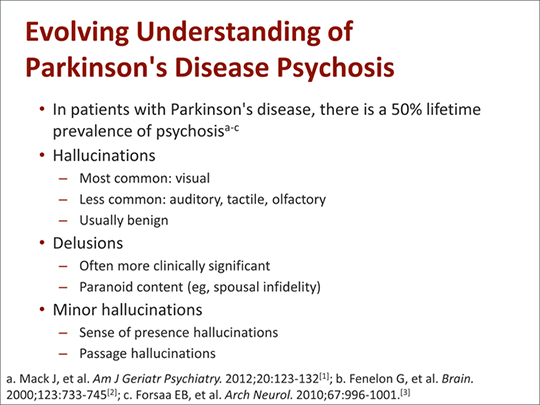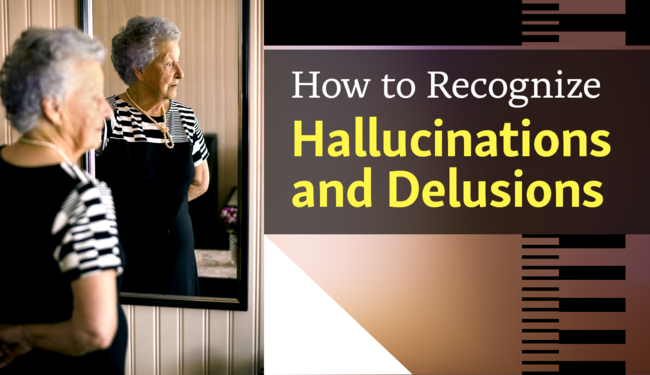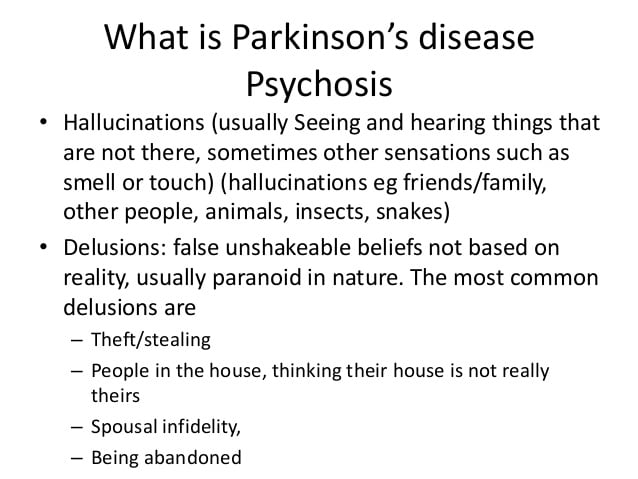Hallucinations Delusions And Parkinson’s
It is estimated that about 50% of people with Parkinsons will, at some point, experience hallucinations. They can affect younger people but are more often associated with those who are older and have had Parkinsons for some time.
Hallucinations experienced early in Parkinsons may also be a symptom of the condition dementia with Lewy bodies; so it is important to let your doctor know if hallucinations begin at an early stage.
Parkinsons itself can be a cause of hallucinations and delusions, but very often they are a side effect of certain medications used to treat the condition. Not everyone who takes Parkinsons medications will experience hallucinations and delusions though. This varies from person to person and is often related to the particular type of medication and dosage.
Other factors may also be involved such as underlying illness, memory problems, sleep difficulties and poor eyesight.
Risk Factors For Psychosis
Not everyone with Parkinsons will develop hallucinations or delusions, but there are several things can increase your risk:
- Dementia;or impaired memory
- Depression: Individuals suffering from depression and PD are at a greater risk. In addition, severe depression alone can cause psychosis.
- Sleep disorders, such as vivid dreaming. Individuals commonly report vivid dreaming prior to the onset of psychosis. Other associated sleep disturbances include REM;sleep disorder and general insomnia.
- Impaired vision
- Use of PD medications
What To Do About Parkinsons Hallucinations
Hallucinations or other signs of Parkinsons psychosis should be discussed with a doctor. Depending on the cause and severity of hallucinations, the person may or may not need treatment. If an infection is the cause, it should be treated accordingly. A doctor may want to change or reduce the dosage of any medications that could cause hallucinations to stop Parkinsons psychosis.
In mild cases of hallucinations, the person may be aware that the images are not real. In these cases, if the hallucinations are not causing any distress, pharmaceutical treatment may not be necessary. Sometimes improved lighting in darkened or shadowy areas may help reduce occurrences.
Sometimes the person may not realize he or she is hallucinating. In these cases, especially if the hallucinations are severe and disturbing, a doctor may recommend adjustments to the persons current Parkinsons medications. However, this could potentially worsen movement-related Parkinsons symptoms. If these symptoms affect the persons quality of life, a doctor may instead recommend antipsychotic drugs, particularly clozapine or quetiapine, which typically help reduce hallucinations without affecting other Parkinsons symptoms.
Recommended Reading: Life Expectancy Of Someone With Parkinson’s
Examples Of Delusions In Pd
- Jealousy
- Belief: Your partner is being unfaithful.
- Behavior: Paranoia, agitation, suspiciousness, aggression.
Age And Duration Of Illness

Increased age has been associated with the presence of hallucinations. This might be explained by accerelated sensory loss or age related side effects of medication. One of the main confounders with age is duration of illness; when the non-independence of these variables was controlled, Fnelon et alfound that duration of illness was the crucial factor. Grahamet al identified two subgroups of patients with Parkinsons disease experiencing hallucinosis: in those with disease duration of 5 years or less, visual hallucinations were associated with rapid progression of the motor but not the cognitive component of the disease. In the remainder with longer histories, visual hallucinations were associated with postural instability, global cognitive impairment, and the lack of depression. Goetz et al contrasted patients with Parkinsons disease who experienced hallucinations within 3 months of levodopa therapy with those who experienced hallucinations after 1 year of treatment. Diagnoses in the early onset group more often changed to Lewy body or Alzheimers disease. Lewy bodies are present to a greater or lesser degree in all cases of Parkinsons disease and are known to be associated with visual hallucinations.
Read Also: Is Parkinson Disease Genetically Inherited
You May Like: Gifts For Someone With Parkinson’s
Risk Factors For Parkinsons Hallucinations
Not much is known about what causes hallucinations with Parkinsons disease. Because people living with Parkinsons disease also are at risk of vision impairment, these problems may contribute to the occurrence of hallucinations. Older people and those with advanced stages of Parkinsons also tend to have a higher risk of hallucinations.
Hallucinations can be a side effect of a medication or caused by an infection. In these cases, the hallucinations are related to Parkinsons but not caused by the disease itself.
Read Also: How Can You Treat Parkinson Disease
What Are Parkinsons Disease
Delusions are false beliefs that are not based on reality. These beliefs are fixed. People experiencing them are unlikely to change or abandon these beliefs, even when presented with evidence that they are false.
Delusions experienced by people with Parkinsons disease are usually of a common theme. These may include:
- Spousal infidelity
- Thinking that people are stealing their belongings
- Thinking people are trying to harm them
- Thinking people may put poison in their food
- Thinking people are switching out or substituting their medications
- Other beliefs based on paranoia
Recommended Reading: Can Parkinson’s Cause Leg Swelling
Medications To Help Treat Parkinsons Disease Psychosis
Your doctor might consider prescribing an antipsychotic drug if reducing your PD medication doesnt help manage this side effect.
Antipsychotic drugs should be used with extreme caution in people with PD. They may cause serious side effects and can even make hallucinations and delusions worse.
Common antipsychotic drugs like olanzapine might improve hallucinations, but they often result in worsening PD motor symptoms.
Clozapine and quetiapine are two other antipsychotic drugs that doctors often prescribe at low doses to treat PD psychosis. However, there are concerns about their safety and effectiveness.
In 2016, the approved the first medication specifically for use in PD psychosis: pimavanserin .
In clinical studies , pimavanserin was shown to decrease the frequency and severity of hallucinations and delusions without worsening the primary motor symptoms of PD.
The medication shouldnt be used in people with dementia-related psychosis due to an increased risk of death.
Psychosis symptoms caused by delirium may improve once the underlying condition is treated.
There are several reasons someone with PD might experience delusions or hallucinations.
What Causes Parkinson Disease
Parkinson disease arises from decreased dopamine production in the brain. The absence of dopamine makes it hard for the brain to coordinate muscle movements. Low dopamine also contributes to mood and cognitive problems later in the course of the disease. Experts dont know what triggers the development of Parkinson disease most of the time. Early onset Parkinson disease is often inherited and is the result of certain gene defects.
Also Check: How Prevalent Is Parkinson’s Disease In The Population
Comparison Of Hallucinators And Non
The patients with isolated minor hallucinations were compared with the patients with no hallucinations . The only significant difference was a higher CES-D score in the group with minor hallucinations . When the presence of depression was determined using the cut-off values of the CES-D, depression was more frequent in the patients with minor hallucinations than in the patients without any hallucinations , but this difference did not reach significance.
The patients with formed visual hallucinations are compared with the non-hallucinators in Table 5. Patients with visual hallucinations differed in a number of respects: they were older, had a longer duration of disease, had a more severe motor state, had more depressive symptoms, and were more likely to have cognitive impairment, day-time somnolence and a history of ocular pathology. They were less likely to receive anticholinergics or selegiline and received a higher daily dose of levodopa, but the levodopa-equivalent dose did not differ significantly between the two groups. Visual hallucinations were recorded in 70% of the patients with dementia versus 10% of non-demented patients , and in 55% of the patients with severe cognitive disorders versus 8% of the patients with absent or moderate cognitive impairment .
The patients with hallucinations of any type were compared with the patients with no hallucinations. The results were identical to those of the preceding analysis, except for the degrees of significance .
Types Of Eye Movements
There are three kinds of eye movements that can change with PD:
- Saccadic rapid eye movements direct us to gaze at a specific object or to read lines of print.
- Pursuit eye movements allow us to follow an object as it moves.
- Vergence eye movements allow us to move our eyes in different directions2
Changes to these eye movements due to Parkinsons can also result in different kinds of visual difficulties. The inability to control eye movements can lead to involuntary blinking, double vision and other motor issues that can affect visual acuity.
Dry eyes can be treated with drops or ointments, warm wet compresses, but are not generally cured. The blink reflex can be impacted by PD. This manifests as either a slowing of the reflex, appearing as inappropriate staring, dry or burning eyes; and by reduced vision. Blepaharospasm and apraxia are two common eyelid motion issues. Blephararospasms are eyelid spasms that cannot be controlled, cause eyelids to squeeze, and can be relieved with Botox injections. Apraxia is a condition that makes it difficult to open eyes. There are specialized lid crutches and cosmetic tape that can be applied to hold the eyelids open.2
Read Also: When Do Parkinson’s Symptoms Start
What Treatments Are Available For Parkinsons Psychosis
Your doctor may first reduce or change the PD medication youre taking to see whether that reduces psychosis symptoms. This is about finding a balance.
People with PD may need higher doses of dopamine medication to help manage motor symptoms. But dopamine activity shouldnt be increased so much that it results in hallucinations and delusions. Your doctor will work with you to find that balance.
Diagnosis And Treatment Of Hallucinations

First, your doctor needs to find out whats causing your hallucinations. Theyll ask about your medical history and do a physical exam. Then theyll ask about your symptoms.
They may need to do tests to help figure out the problem. For instance, an EEG, or , checks for unusual patterns of electrical activity in your brain. It could show if your hallucinations are due to seizures.
You might get an MRI, or magnetic resonance imaging, which uses powerful magnets and radio waves to make pictures of the inside of your body. It can find out if a brain tumor or something else, like an area thats had a small , could be to blame.
Your doctor will treat the condition thats causing the hallucinations. This can include things like:
- Medication for schizophrenia or dementias like Alzheimers disease
- Antiseizure drugs to treat epilepsy
Dont Miss: What Part Of The Body Does Parkinsons Affect
Don’t Miss: What Are The Odds Of Getting Parkinson’s Disease
Memory Problems And Dementia
Research shows that hallucinations and delusions often happen when someone with Parkinsons also has problems with memory, thinking problemsor dementia.
If you experience hallucinations at an early stage of Parkinsons, it could be a sign of another medical condition, such as dementia with Lewy bodies.
Also Check: What To Expect As Parkinsons Progresses
Can Parkinsons Disease Make You Aggressive
Parkinsons disease Dementia or PD Dementia can make a patient very aggressive. Parkinsons Dementia Aggression germinating from Parkinsons disease Dementia can lead patients to behave erratically, experience sudden anger outbursts, feel constantly irritated, and always be in a state of restlessness. Outbursts are generally in the form of:
- Shouting
- Falling
You May Like: Does Parkinson’s Cause Difficulty Swallowing
What Causes Psychotic Symptoms In Parkinsons Disease
Psychotic symptoms in people with PD are usually caused as a side effect of medications used to treat PD. All of the current PD medications can potentially cause psychotic symptoms. Hallucinations and delusions may also be caused by the chemical and physical changes that occur in the brain as a result of PD. 3
Thanks For Signing Up
We are proud to have you as a part of our community. To ensure you receive the latest Parkinsons news, research updates and more, please check your email for a message from us. If you do not see our email, it may be in your spam folder. Just mark as not spam and you should receive our emails as expected.
Also Check: How Long Does Parkinson’s Disease Last
Who Is At Risk For Psychosis
Theres no predicting with certainty which patients with Parkinsons disease will go on to develop symptoms like hallucinations or delusions. A number of risk factors both internal and external- are associated with the condition.Some of these risk factors include: age, duration and severity of Parkinsons disease; and the taking of dopamine therapy.3-6
What Is The Link Between Seizures And Dementiablog
There are some symptoms of dementia that are more commonly known, such as memory loss. Seizures are a less common symptom of dementia that are not as understood. Hear from one of our dementia researchers who has been studying seizures in people with the condition.
How common are epileptic seizures in dementia? Who is most at risk of having them? What do these seizures look like? What effect do they have on how someones memory changes over time?
These are the questions that I have been researching since starting my PhD in 2016.Im astudent funded by Alzheimers Society as part of the University of Exeter doctoral training centre.
You May Like: Does Parkinson’s Disease Eventually Kill You
Hallucinations In Parkinsons Disease
Hallucinations are seeing, hearing, or feeling something that is not actually there. Most hallucinations experienced in PD are visual, although some people experience auditory, tactile , or olfactory hallucinations. Hallucinations occur when the person is awakenot sleeping or dreamingand can occur at any time of day or night. They can be frightening, for the patient experiencing them as well as their caregiver. Generally, hallucinations are repetitive and last for a short duration.1,3
What Are The Symptoms Of Psychosis

Two of the most prominent symptoms are hallucinations and delusions.7 Hallucinations involve seeing, hearing, experiencing or sensing things that are not really there. Delusions are false beliefs that are not based in reality. In describing symptoms of Parkinsons disease psychosis, patients may use such common terms as: seeing things, paranoia, flashbacks, nightmares, false beliefs, or not being in touch with reality.8
You May Like: What Is Parkinson Like Syndrome
A Positive Mental Attitude
Focusing on the positive ways you can help your parent instead of worrying about how to prevent their Parkinsons from worsening can help to remove stress and anxiety from the situation.
While there are many treatments to ease your parents symptoms theyll benefit enormously from having their family and friends around them, supporting them as they face such a degenerative disease. Love, acceptance and friendship go a long way when caring for a parent with Parkinsons.
How To Care For Someone Who Experiences Delusions
If the person youre caring for experiences confusion or delusions, heres what you can do in the moment:
- Stay as calm and patient as you can and remember that this belief has nothing to do with you and only with what is going on in their mind
- Remove any objects in the room that could pose a danger to them or to anyone else
- Clear space so there are no tripping hazards and its easy for the person to move around
- Do not try to reason with the person or convince them why their belief is false
- Reassure them that everything is going to be okay
- If the person becomes aggressive, minimize your movements and remain calm
- Ask the person to talk to you about what they are feeling and really listen to them so they dont feel threatened
- If you feel like you or they are in danger, call 911
Here are a few actions you can take once the delusion has passed:
- Inform their doctor immediately
- Educate others who may care for the person how to handle the situation if it happens
- If the person is open to it, discuss it with them and ask them to explain what the experience is like for them and if theres anything different you could do next time
- Seek expert advice if you feel like you need support in managing these episodes
Recommended Reading: Does Parkinson’s Run In Families
Phenomenology Of The Hallucinations
Minor hallucinations/illusions
We grouped together in this category three types of phenomena. The most frequent type was presence hallucinations . The patient had the vivid sensation of the presence of somebody either somewhere in the room or, less often, behind him or her. In all cases, the presence was that of a person, and in one case it was also occasionally the presence of an animal . In seven cases, the presence was that of a relative . In all the other cases the presence was unidentified. The presence hallucinations were commonly as vivid as a hallucinated scene and were described as a `perception’. For instance, one patient said: `the image is behind me’, a second said: `I see someone arriving; I turn back but nobody is there’, a third said: `I take a look; I don’t see anything, but it is engraved in my mind’, and another said: `I have the impression that my mother is always there, that she is about to come into sight’. The passage hallucinations consisted of brief visions of a person or an animal passing sideways. If an animal was seen, the species was almost invariably specified , and in two instances it was a dog previously owned by the patient. Illusions occurred in nine patients . In five cases the illusion consisted of the transformation of an object into an animal .
Case 1 .
Case 2 .
Formed visual hallucinations
Case 3
Auditory hallucinations
Case 4

